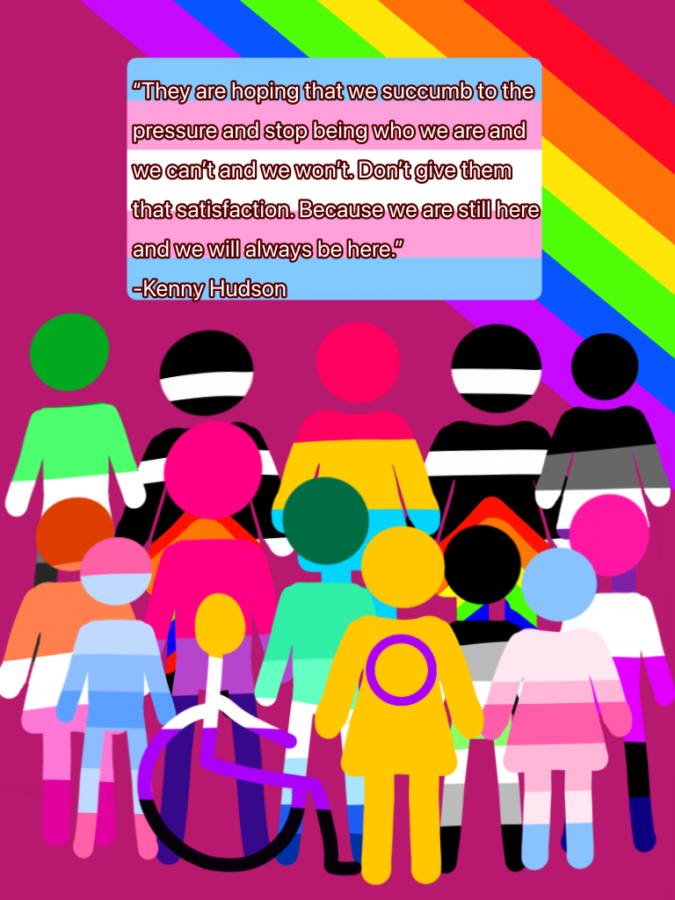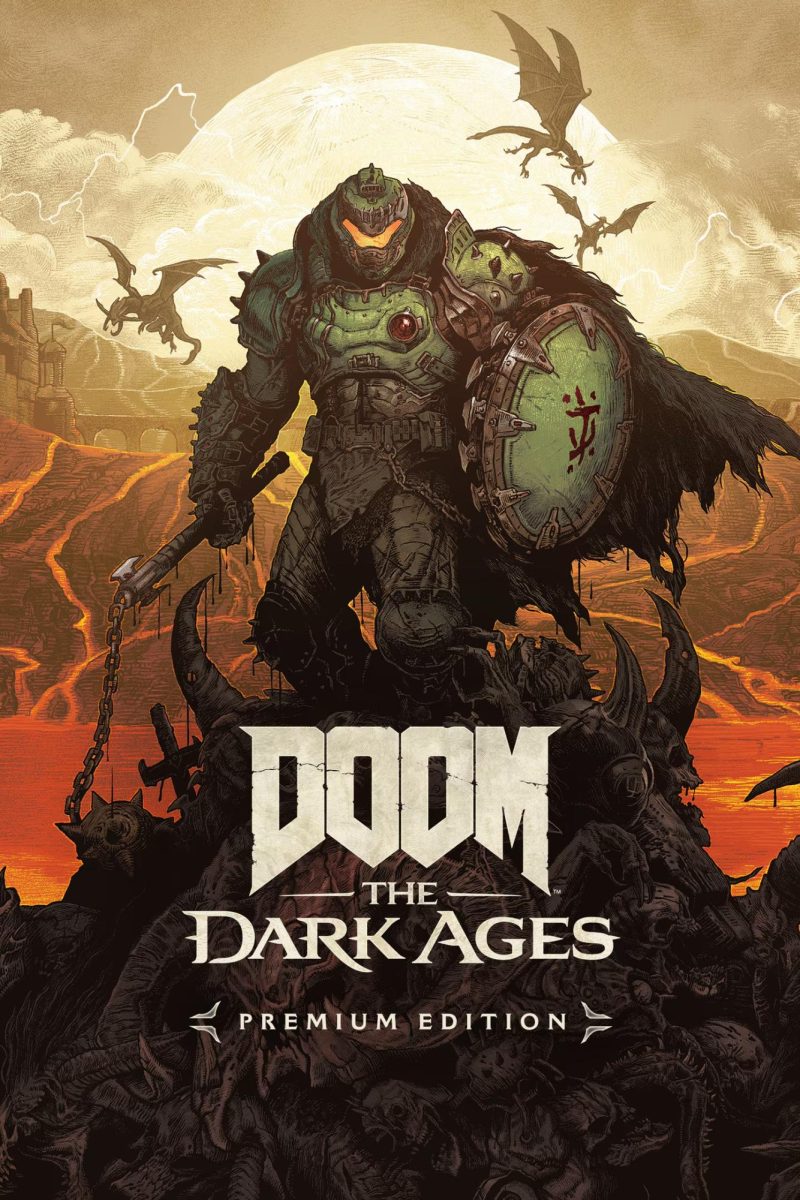
After he gets out of high school, senior Kenneth Hudson, a trans man, plans to seek gender-affirming care, specifically top surgery.
However, because that care is being banned across the country, Hudson is worried that it will be inaccessible to him.
“It’s been something that I’ve wanted to do for years, but now that trans healthcare is under attack it’s scary; I’m terrified that I have to get this done sooner rather than later, because what happens if I’m ready to go and all of a sudden, everything is destroyed there?” Hudson said.
This year, the number of anti-trans and anti-LGBTQ+ legislation in the U.S. has more than doubled compared to 2022. According to the website Trans Legislation Tracker, there are 556 bills introduced just this year, with 80 bills passed and 372 enacted. In 2022, there were 174 bills, with 26 of them passed.
These bills and laws range from preventing trans people from using the bathroom of their gender identity, restricting trans kids from school sports and not allowing trans people in the military. Others have banned gender-affirming care, lifesaving medical treatment that trans people use to affirm their gender identity.
“People kind of just see it as a cosmetic thing, which it is technically a cosmetic surgery. However, it is recognized as medically necessary now because it is a treatment for gender dysphoria. Gender dysphoria can kill. It can kill just as easily as depression can and it is often a precursor to depression for trans people,” Hudson said.
Gender dysphoria is a feeling of distress or unhappiness related to one’s gender identity not matching up with the way their body looks, causing them to feel uncomfortable.
“I know that a lot of my depression was caused by gender dysphoria and was caused by not having the body that fits what I am in my head; that was solved by being around people that see me as I truly am. But it’s not fully gone away. And that is why I’m seeking gender-affirming care,” Hudson said.
Although the politicians behind these bills say they are to protect children from medical “experimentation,” gender-affirming care is actually backed by the American Academy of Pediatrics and other organizations. The Journal of the American Medical Association also published research in February finding that puberty blockers and gender-affirming care reduces suicide risk by 73%.
Math teacher Leigh Ann Mahaffie is not trans, but a straight cisgender ally, meaning her gender identity aligns with the sex assigned at birth.
“I think the states that are saying that you can’t have gender affirming care and that it’s child abuse, they are saying that you can’t possibly know your own body, and they’re ignoring modern medical standards. I think they’re saying that they’re putting political belief, political power over what’s best for kids,” Mahaffie said.
Mahaffie says that the anti-trans legislation around the country is being created because those in power have to find people to villainize and blame for problems.
“Some groups like to otherize groups, and their philosophy is built on fear and otherizing people. And if you don’t have hope, and an aspiration of forward and what the positive can be, you have to build up hate and fear,” Mahaffie said.
AP Psychology teacher Britt Coleman says that people think that being transgender is a lifestyle choice; there’s a misunderstanding that people, especially youth, choose to be trans because they think it’s a cool trend or their teachers influence them to be trans.
“Although I don’t know why someone would actively choose to be part of a discriminated against population. It doesn’t necessarily make their life easier if they were to choose to belong to a group that was facing discrimination legally, socially, violence sometimes,” Coleman said.
Because of the discrimination from these laws, the mental health of trans youth has been negatively impacted. The Trevor Project, a nonprofit organization supporting LGBTQ+ youth, surveyed 35,000 LGBTQ+ youth ages 13 to 24, 48% of them being trans or nonbinary, in 2022. More than half, 60%, reported that their mental health had deteriorated as a result of the anti-trans legislation.
“[The legislation is] demonizing LGBTQ+ and trans people as groomers and pedophiles and things like that, which isn’t true. A lot of the fearmongering is like, ‘If we don’t pass these laws, then [trans people are] going to target your children. So we’ve got to protect the children by doing this,’” Coleman said.
Even within the LGBTQ+ community, trans people are often ostracized. There is an online movement called “LGB without the T,” which claims that trans and nonbinary people are harming the community and should be kept separate from lesbian, gay and bisexual people. Hudson says that the infighting comes from a difference in opinion.
“The problem is that within every group, whenever there is a cause, there are people who have different ideas on how to best work their cause. So even back during the Stonewall Riots, around that time, there was members, lesbian, gay, bisexual, etc. who were against trans people being a part of their group because they thought that trans people were kind of ruining it for them,” Hudson said.
Hudson said that even if cis LGBTQ+ people don’t agree with trans people, they could mind their own business because being trans doesn’t affect anyone else’s lives.
“I think either be welcoming with open arms or accept that we are not hurting anybody and mind the business that pays you,” Hudson said. “If our rights are being taken away, y’all are next, honestly. That’s not a threat. That is the truth. If they come for trans people and they take away our rights, who do you think they’re going to go for next? They’re going to go for gay marriage, immediately.”
K-12 PSD social worker Bekah Qualls is a cisgender member of the LGBTQ+ community and uses the label queer to describe her identity. She says the infighting makes her feel sad because it increases a sense of loneliness and isolation.
“I believe that we as a community, it’s difficult to reconstruct community when we don’t have plans for reconstruction. If we’re experiencing infighting because differences or thoughts or beliefs or belonging,” Qualls said.
Mahaffie says that in the face of the legislative discrimination, cishet allies like herself are especially needed. While trans people can and do stand up for themselves, they are often dismissed, so those with privilege need to amplify trans voices.
“I think that as an ally, I have to be careful and not overstep. Allies have to make sure that we are supporting, and not acting as if our voices are more important – but truly lifting up the community voices we are there to support,” Mahaffie said. “I have to make sure that my speaking out is welcome and wanted – in the case of anti-trans, anti-gay legislation, the LGBTQ+ community has been clear that all support against the legislative movement showing up across the nation is welcome. Also, for gay and trans folk, their lives are literally at risk, and mine isn’t when I speak up.”
Even though the legislation across the country is directly attacking trans people’s rights to exist, Hudson wanted to send one final message to any trans person concerned about the situation.
“Every day that we exist, it’s a reminder that we’re still here. Every day that you wake up, is going against what they want and that’s living your truth. So, yeah, they are hoping that we will succumb to the pressure and stop being who we are and we can’t and we won’t. Don’t give them that satisfaction. Because we are still here and we will always be here,” Hudson said.








